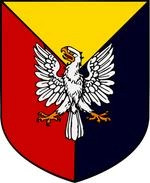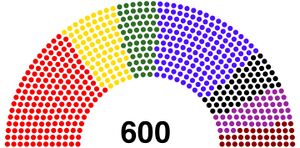Bundestag of Germany
Federal Diet of Germany Bundestag von Deutschland | |
|---|---|
| 27th Bundestag | |
 | |
| Type | |
| Type | |
| History | |
| Founded | December 14, 1918 |
| Preceded by | Reichstag (German Empire) |
New session started | July 2nd, 2022 |
| Leadership | |
Chancellor | Wilhelm Gräbe, Social Democratic Party since July 1st, 2014 |
Speaker of the Bundestag | Gerhard Eckhardt, Social Democratic Party since July 1st, 2014 |
Leader of the Opposition | Dietmar Weidel, Conservative Party since July 1st, 2014 |
| Structure | |
| Seats | 600 |
Political groups | Government (312) |
Political groups | Opposition (288)
|
Length of term | 4 years |
| Authority | Article II of the German Constitution |
| Salary | $200,000 |
| Elections | |
| Proportional representation | |
First election | December 10th, 1919 |
Last election | July 1st, 2022 |
Next election | On or before July 1st, 2026 |
| Motto | |
| "Dem Deutschen Volke" | |
| Meeting place | |
| Reichstag builidng, Berlin | |
The Bundestag ("Federal Diet") is the German national parliament. It is elected every 4 years by the Gemran people. It was formally established by Article II of the German Constitution of 1919, although it was truly founded a year earlier during the German Revolution. It is considered the successor to the German Empire's Reichstag.
The Bundestag is composed of 600 seats, divided among the parties by proportional representation. It meets in the former Reichstag building of the German Empire in Berlin. It is elected at most every 4 years, although the Constitution provides for dissolution of Parliament and early elections by the President. It elects the Chancellor, Germany's head of government, approves the Chancellor's Cabinet, and creates the government's budget.
History
The Bundestag was founded by the revolutionaries of the German Revolution in 1918, and was formally established with the ratification of the German Constitution in 1919.
Age of Reform
In the period between 1919 and 1929, the Republic underwent a series of constitutional reforms that got rid of numerous portions of the German Constitution, such as Article 48, which gave the president the ability to rule by decree, and added Article 52, which required the President to call new elections after dissolving the Bundestag, Article 53, which banned any attempts at destroying the constutional order, which caused numerous extremist groups like the NSDAP and KPD to be banned, Article 54, which required laws to adhere to the Constitution, and Article 55, which required parties to gain at least 5% of the vote to be represented in fhe Bundestag.
Tasks
The Bundestag is Germany's legislative branch of government. Legislation is proposed by the Chancellor or by his cabinet, and must be approved by the Bundestag and signed by the President to pass. The Bundestag also serves as a check on executive power. An example of that is the calling of a Question Hour, where if a third of the Bundestag requests it, the Chancellor and Cabinet may be asked about policies, new laws, etc. This is mostly used by the opposition to scrutinize government policy and laws.
Terms
Each Bundestag has a 4 year term, with elections happening 4 years after the previous one. Each Election Day is a national holiday. New elections may be called for by the President, either after a loss of a Vote of No Confidence by the ruling coalition, or on their own discretion when requested by the Chancellor.
